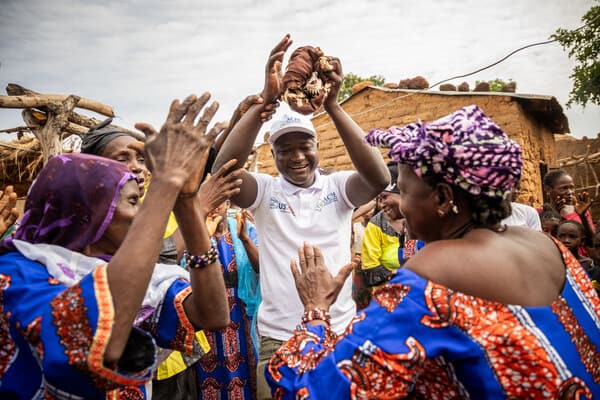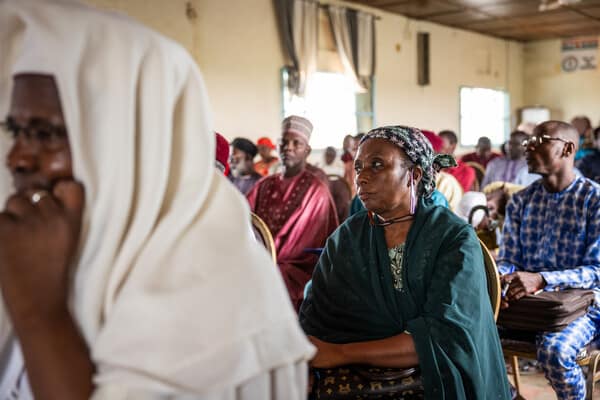Democracy Day 2023: Local solutions to the rising tide of authoritarianism
By: Michael J. Zamba
Burkina Faso is a challenging country for civil society and citizens who are promoters of democracy, its ideals and the institutions that support its growth. Two successive coups have pushed the country from “partly free” to “not free” on Freedom House’s list of “Freedom in the World 2023.”
Indeed, USAID cautions that “modest development gains in Burkina Faso are threatened by political instability, violent extremism, internal displacement and the impacts of climate change.” The agency lists the country as one of the poorest in the world, with high rates of illiteracy and malnutrition.
Karl Jean Louis, Chief of Party of the USAID-supported Inclusive Governance for Resilience, which is implemented by Creative and local partners, says, “Burkina Faso is a complex situation where democratic norms, values and institutions are under attack through organized campaigns.”
“The perception of democracy in Burkina Faso is that it is linked with Western values, and in those Western countries people may more easily see the benefits of the democratic process,” Jean Louis says. “Unfortunately, in Burkina Faso there are too few concrete results of democracy that people can see. The current government in Burkina is very popular, even while it continues to shrink citizens’ freedom of expression and monitors CSOs, especially those organizations that are promoting democracy.”
Burkina Faso is not unique. “More than one-third of the world’s population live under authoritarian rule,” the Economist Intelligence Unit’s most recent report said, which listed Burkina Faso as “authoritarian.” Slightly more than 43 percent of the countries analyzed have “democracies.”
Promoting and strengthening democratic ideals and institutions among citizens, as well as the non-governmental guardrails like civil society organizations.

U.N. Secretary General António Guterres’ 2023 Democracy Day message said, “the walls are closing in on civic spaces. Mis- and disinformation are poisoning public discourse, polarizing communities and eroding trust in institutions.”
Addressing these challenges, as well as building trust among communities, being inclusive and strengthening institutions to become responsive to residents’ needs, require nuanced and contextually appropriate approaches to complex local situations, says Susan Kemp, Creative’s Governance Practice Area Director.
“Creative uses a people-centered governance approach, convening citizens, civil society groups, the private sector and government officials to engage in dialogue and build trust; facilitating spaces for communities — including underrepresented populations — to voice their needs, perspectives and priorities; and supporting actors across the governance system to partner in addressing citizen needs to strengthen responsive governance,” Kemp says.
“This requires staying attuned to contextual shifts and strengthening the capacity of actors to gather and use data and engage with one another to facilitate meaningful participation, inclusion, transparency and accountability.”
In Burkina Faso, Louis says the USAID-supported Inclusive Governance for Resilience project is working with more than 10 community-based organizations and plans to double that number in the coming months to advocate for community needs and counter threats to their democracy.
“Working with local CSOs, we are carefully crafting training activities and community radio civic education programs to reinforce the norms and values of democracy,” he says. “These programs will also help us to capture the public’s perception about democracy and democratic institutions.”
Louis is aware of the local situation and actors — and ensuring that government officials are involved in the process, too. “To avoid problems, we are carefully crafting our messages and ensuring that local authorities also play a role in all our efforts,” he says.
In addition to Burkina Faso, Creative’s teams are working with diverse local partners in Guatemala, El Salvador, Honduras, Ethiopia, Syria and elsewhere to strengthen institutions, services and civil society. Led primarily by local staff and organizations, their efforts are focused on shifting behaviors and norms, combat mis- and disinformation and promote inclusion and meaningful participation in countries’ governance processes. (Please see our question-and-answer story with the Honduras Sembrando Esperanza team.)
While not all programs are developed specifically to address governance or democracy per se, many projects have components and activities that strengthen those ideals and institutions given the importance of governance for peace, stability, and violence prevention.
In West Africa, the five-country USAID Reacting to Early Warning and Response Data in West Africa, better known as REWARD II, has prioritized a return to democracy during the past five years as part of the solution to the rising tide of violent extremism, disenfranchisement, poor government services and disinformation.
REWARD II’s Chief of Party, Alimou Diallo, says the team focused on challenges related to peace, security and democratic process in Benin, Togo, Guinea, Mali and Niger. It issued more than 200 locally driven and implemented grants to support the priorities of each community — including educating and registering internally displaced persons to participate in Mali’s elections and including youth in local decision making in Benin.

“The design stage focused on working with the stakeholders in country to identify their priorities,” says Diallo. “So that consultation was able to identify the basic needs and priorities in terms of peace, security and development. And the project implementation process was also designed to make sure that it fits into existing processes and the countries’ institutional infrastructures. Where they are weak, we strengthen them and [support their development] where these do not exist.”
Diallo says the approach from the initial phase was key to the program’s successful results. Working with USAID in West Africa, REWARD II sought local civil society organizations instead of larger national or international groups as implementing partners. “That turned out to be very positive because they understood the context and they knew the issues and they were able to navigate around all the challenges and implement successful programming,” Diallo says. (Learn more about REWARD II in this short documentary.)
When the world celebrated Democracy Day 2023 in September, its theme was “Empowering the Next Generation,” which was one of the core principles during REWARD II’s five years of locally focused program programming. In Benin, one NGO worked to better engage youth in civic affairs.
“Youth always think that the authorities need to do everything for them,” says Christian Houegnanfode, youth leader in the community of Ifangni, Benin. “One of our objectives is to tackle the problem of youth reluctance to involve themselves in the management of the community’s wellbeing. Today, thanks to the project, we’ve noticed that some of the youth do want to learn and get involved.”
Houegnanfode says local NGO-led training focused on elections and youth were a significant step forward. “Elections are always a big moment during which things can take a turn,” he says. Through these trainings, “we were able to notice a positive change in the attitude of the people with regards to the elections. We also noticed some positive impacts amidst the community.”
